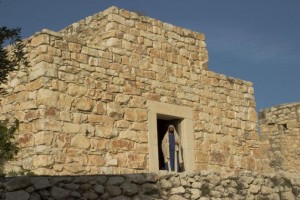
Synagogue at Nazareth
Today’s Gospel reminds us of a key point:
Lk 4:16-30
Jesus came to Nazareth, where he had grown up,
and went according to his custom
into the synagogue on the sabbath day.
He stood up to read and was handed a scroll of the prophet Isaiah.
He unrolled the scroll and found the passage where it was written:
The Spirit of the Lord is upon me,
because he has anointed me
to bring glad tidings to the poor.
He has sent me to proclaim liberty to captives
and recovery of sight to the blind,
to let the oppressed go free,
and to proclaim a year acceptable to the Lord.
Rolling up the scroll,
he handed it back to the attendant and sat down,
and the eyes of all in the synagogue looked intently at him.
He said to them,
“Today this Scripture passage is fulfilled in your hearing.”
And all spoke highly of him
and were amazed at the gracious words that came from his mouth.
They also asked, “Is this not the son of Joseph?”
He said to them, “Surely you will quote me this proverb,
‘Physician, cure yourself,’ and say, ‘Do here in your native place
the things that we heard were done in Capernaum.’”
And he said,
“Amen, I say to you, no prophet is accepted in his own native place.
Indeed, I tell you,
there were many widows in Israel in the days of Elijah
when the sky was closed for three and a half years
and a severe famine spread over the entire land.
It was to none of these that Elijah was sent,
but only to a widow in Zarephath in the land of Sidon.
Again, there were many lepers in Israel
during the time of Elisha the prophet;
yet not one of them was cleansed, but only Naaman the Syrian.”
When the people in the synagogue heard this,
they were all filled with fury.
They rose up, drove him out of the town,
and led him to the brow of the hill
on which their town had been built, to hurl him down headlong.
But he passed through the midst of them and went away.
It was very clear that the townspeople of Nazareth were shocked at the wisdom of Christ. The “unveiling”, literally “revelation” (Gk) of the true identity of Jesus was beginning.
Clearly, Jesus would have been known to the people of his adopted hometown of Nazareth as a hard worker, the son of Mary, and, so it was thought, of Joseph. No doubt he was an upstanding citizen and full of virtue. But Jesus did not seek to stand out in any strange way, to draw attention to himself before the opportune time, before his “hour” to borrow an expression from the fourth gospel, had come; before his public ministry began.
As a friend of mine once said, the hierarchy of the Church are to show forth and replicate the public life of Christ, while the laity are called to replicate the so called “hidden” life of Christ – which was actually the vast majority of his earthly life – sanctifying themselves, their work, and others, for Christ’s sake, in a completely natural way.


the sort of things Jesus said would not be a great moral tcaheer. He would either be a lunatic — on the level with the man who says he is a poached egg — or else he would be the Devil of Hell. You must make your choice. Either this Man was, and is, the Son of God, or else a madman or something worse. You can shut Him up for a fool, you can spit at Him and kill Him as a demon or you can fall at His feet and call Him Lord and God, but let us not come with any patronizing nonsense about His being a great human tcaheer. He has not left that open to us. He did not intend to. — C.S. Lewis (Mere Christianity)